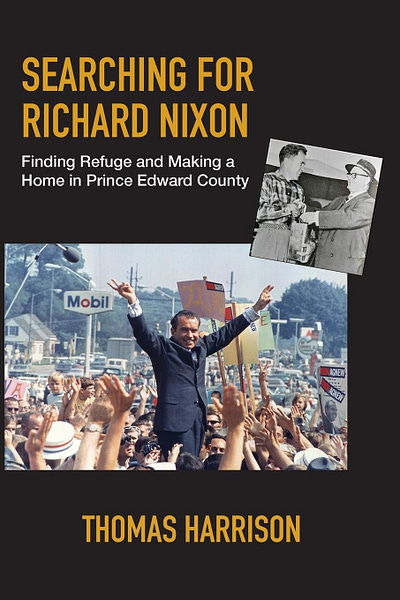Writing can feel like a solitary activity, so it’s important to remember: you’re not doing this work alone. Many others are at their desks right now, working to tell their true and important stories, including this month’s highlighted writer Thomas Harrison. Below you’ll find:
an interview with Thomas, and
a list of CNF writing opportunities—publications and contests that are currently looking for nonfiction submissions.
Next month, I’ll be back with more of my own thoughts on the nonfiction writing life. For now, I’m excited to introduce you to a new writer-friend, Thomas!
Is “Searching for Richard Nixon: Finding Refuge and Making a Home in Prince Edward County” your first book? How long did it take to write from idea to publication?
Yes, this is my first book-length creative work. The initial idea coincided exactly with the Presidential campaign in 2016, though it took till late 2023 to complete the manuscript, which was published in February of 2025. The story of how the book came about, and some of the things that happened in its realization is an essential part of the work.
Searching for Richard Nixon is a blend of historical nonfiction and memoir. Perhaps you can tell us a bit about the book and its structure. I’d also be curious to hear what sort of research you did.
The pitch for my book is SlaughterHouse Five meets All the President's Men, and the characters all go with me for a weekend On Walden Pond.
The book braids together 3 different stories. First, it's framed by Richard Nixon, his background and career, his secret 1957 visit to Prince Edward County and later visit to Canada in 1972. I used mostly secondary sources for this portion, though I did speak with one of Nixon's legal advisors directly. I also interviewed two people who met Nixon on the streets of Picton in 1957, and several other individuals who appear in various parts of the book. I relied on primary documentary evidence and archival research for much of this part of the text.
The second braid is in the form of personal memoir. It's the story of my research into Richard Nixon, the many connections I found between his times and ours, and my own experiences. I also describe my challenges in completing the work, while isolated and alone during the pandemic restrictions. This period led to a lot of self-reflection. Completing the book was one part of a fundamental change in my perspective and approach to life. During this time I also took up other pursuits like painting and acting, in addition to developing a regular writing practice (including classes with great instructors like Becky Blake!).
The third element can be best described as a 'love story' of Prince Edward County itself. In exploring where Nixon went in PEC, and where he took me geographically, historically and through local literature, the book became a way during Covid to breach the self-isolation by connecting me with friends and neighbours in my community. Like Nixon, who found refuge here for a weekend, my Quinte's Isle home has often been a place of escape, and has its own story to tell. It's where my family settled and has made a home over the last couple of decades. We are not alone. Most who live here now have a historical record of finding respite here. In this portion I mostly rely on historical non-fiction and a little bit of literary journalism to explore, what around here we just call, 'the County', past and present.
Did you have to use some creative nonfiction techniques like perhapsing to fill in any gaps?
I used a lot of perhapsing - and tried to be very clear in the text or in the notes where this was occurring. There are a lot of gaps in the historical record - and in the details, some of which could be inferred, but much of which had to be imagined.
Any tips for writers of historical NF?
In writing there's a saying 'you have to kill your darlings', meaning some of your most precious writing might have to be edited out. I say instead, when writing in this genre, 'put your darlings in the endnotes'! That’s probably why I have more than 40 pages of sources documented!
Are there any CNF or historical NF writers who inspire you?
I have always read CNF. I grew up with The Right Stuff by Tom Wolfe, and spent a childhood reading literary journalism in magazines and newspapers. I love Mary Karr's memoirs, and historical nonfiction of all kinds. A recent favourite is one of Mary Beard's classical civilization histories, like SPQR. But I also enjoy Canadian history and politics stories, classics by Pierre Berton, Steve Paikin, Mark Bourrie. I also love travel stories, many of which involve moves to the country and experiences with rural living, like the Nearings’ The Good Life, or Dan Needles’ tales of moving from the city.
What are you hoping readers might take away from your book?
I hope readers understand the appeal of Prince Edward County, what drew Nixon, me and so many others here. I think many will connect with the journey of personal discovery I took in writing the book, especially during the difficult period we all experienced during Covid. But also more broadly, the journey I took in moving to the County and lately in re-inventing myself as an artist in late middle age. The description of Nixon's largely undocumented and poorly remembered trips to Canada fill an important gap in Presidential & Canadian history. The book reveals a different view of one of the most notorious political figures in American history, and also serves as a timely contrast and comparison to some of our present political challenges, including in dealing with Donald Trump.
Do you have any new writing projects on deck?
I have a poetry chapbook I'm looking at publishing in the next year. I'm also researching a notorious murder trial, here in Picton, that occurred when the circus came to town in 1903; I don't know if this project will be a book or an article yet. I recently submitted a personal essay to OffTopic publishing which will be published shortly, and I'm thinking of it as a possible frame for a longer 'coming of age' style memoir down the road.
You can download and read an excerpt from Thomas’s book here:
The book is available for purchase here.
THOMAS HARRISON is a teacher, farmer, lawyer and artist who lives on his family horse farm in Prince Edward County, Ontario. He got his start tutoring at Kingston Penitentiary and now teaches at Durham College in Whitby, ON. He has also taught at Queen's University, Seneca College, and at high schools in Toronto. An emerging visual artist and actor, Thomas also writes in multiple genres, including as a scholar and journalist, and in historical and creative nonfiction. “Searching for Richard Nixon: Finding Refuge and Making a Home in Prince Edward County” is his first publication of a book-length creative work.
You can follow Thomas on Instagram here.
Interested in being featured in a future issue? Contact me with links to online creative nonfiction work to be considered.
Some upcoming opportunities
Nonfiction of up to 6,000 words can be submitted to Ploughshares Emerging Writers Contest by May 15.
SubTerrain’s Lush Triumphant Literary Awards is accepting CNF submissions of up to 4,000 words until May15.
The Hippocampus spring submission window is closing on May 31. Send them personal essays or memoir excerpts of up to 4,000 words before then.
ROOM Magazine’s annual CNF contest is now open for entries of up to 3,500 words. The judge is memoirist Amy Lin and the deadline is June 1.
The Fiddlehead’s annual CNF contest is now open for entries of up to 6,000 words. The judge is Nicole Breit and the deadline is June 2.
Know someone who might enjoy this content? Feel free to share it!





Such an interesting interview with Thomas, Becky. His new book and future projects sound fascinating. As someone about to embark on a similar multi-genre/multi-storied writing project (and also in the 'peak' of middle-age), I was most interested to read about his process for researching/compiling the historical evidence. Picton is a stunning locale and I imagine setting, along with fascinating characters, adds to his storyline. I'd love to hear more about his publishing experience if he's willing to share. I have followed Thomas on Instagram. :)
As someone who grew up in Prince Edward County, it's fun to hear from folks who make it their chosen home!